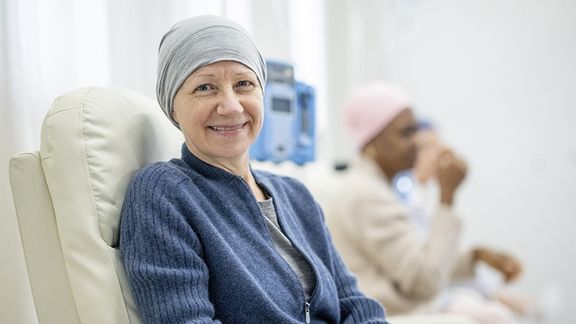Bringing Support to You
You and your family are not alone on your cancer journey. Our QMG Cancer Institute team recognizes the profound impact of a cancer diagnosis, and we are committed to providing comprehensive support that extends far beyond medical treatment. We offer a wide range of services designed to address your physical, emotional, and practical needs throughout every stage of your care.
Our support groups bring people together to share their journeys, find comfort, and learn from each other’s experiences. The following groups are led by a qualified oncology social worker and therapist.
Companions of Hope Caregiver Support Group:
Navigating the challenges of caring for a loved one with cancer or a chronic health condition can be overwhelming. This support group is a safe haven where caregivers can connect and find strength in support.
Every Third Tuesday of the Month
11:15 a.m. — 12:15 p.m.
at the QMG Nutrition Services Classroom
1025 Maine Street, First Floor, Quincy, IL
Cancer Connect Support Group:
This group offers support for those affected by cancer, including those undergoing treatment, survivors, and caregivers. The group provides a safe space for participants to connect with each other, share experiences, and find encouragement.
Every Third Thursday of the Month
5:30 – 6:30 p.m.
at the QMG Cancer Institute
3301 Broadway, Quincy, IL
Nutrition Counseling
Eating well is a powerful tool throughout your cancer journey. The right foods, before, during, and after treatment, can significantly improve how you feel and even lessen side effects.
Our registered dietitian at the Cancer Institute is here to support you every step of the way. They understand the challenges you might face, including taste changes, food sensitivities, and digestive issues related to treatment.
Our dietitians can help you navigate these issues, make informed dietary choices, and ultimately achieve and maintain good health.
Quincy Medical Group Foundation
The Quincy Medical Group Foundation, established in 2007, focuses on giving back to our communities and supporting our patients. We understand that a cancer diagnosis can bring a multitude of challenges, and often, financial burdens can add significant stress. This is where our foundation comes in to help.
We offer two specific programs designed to support oncology patients:
Oncology Patient Assistance Fund:
This fund provides short-term financial assistance for essential living expenses beyond medical needs. If you are currently undergoing cancer treatment, we can help with expenses like rent/mortgage, utilities, groceries (through gift cards), gas (through gas cards), car payments, and phone bills.
Moments that Matter:
A cancer diagnosis can make it difficult to prioritize the things that bring you joy. Moments that Matter aims to change that by granting bucket list wishes to any patient with a life- limiting illness, regardless of their treatment choices. Our goal is to make every moment count, fulfilling as many wishes as possible to create a truly individualized and positive experience.
Speak with our QMG social worker for more information on these programs and how they can support you.
The Beyond Shop:
Cancer treatment can bring emotional challenges alongside physical ones, like hair loss. The Beyond Shop understands. We offer a comfortable, private space designed just for you, where you and your loved ones can browse products and services tailored to your specific needs.
Our Care Navigators are here to guide you one-on-one. They’ll help you find the items and information you need. Services and products available include:
- Wigs
- Hats
- Scarves
- Head coverings
- Mastectomy support pillows
- Port Pillows
- Breast prosthetics
- Supportive bras




